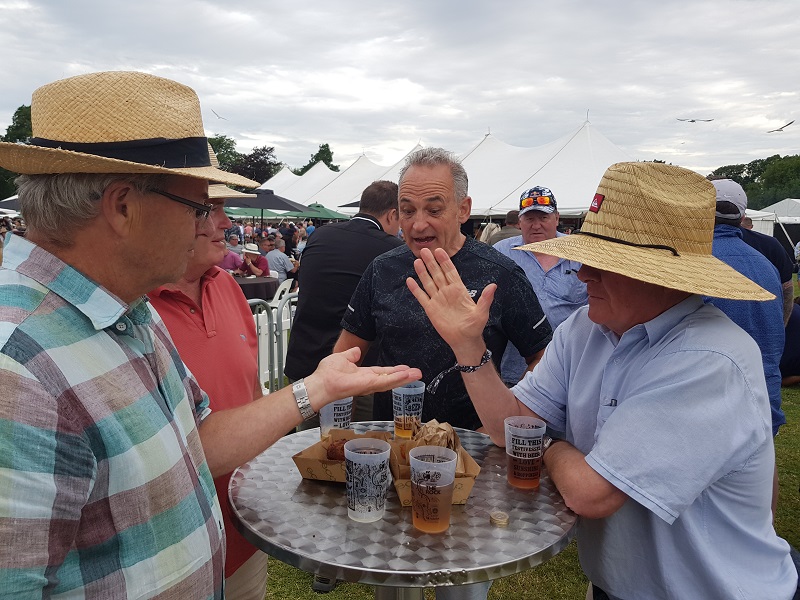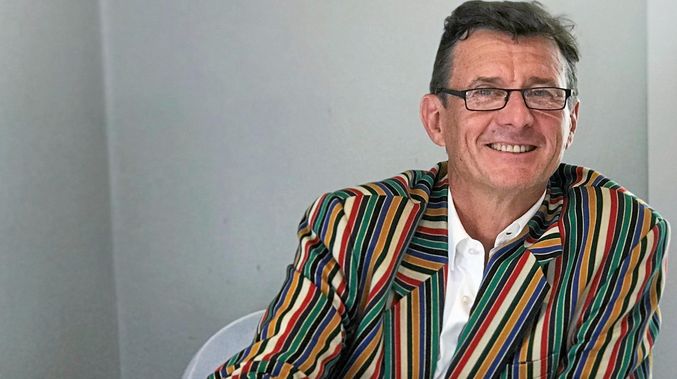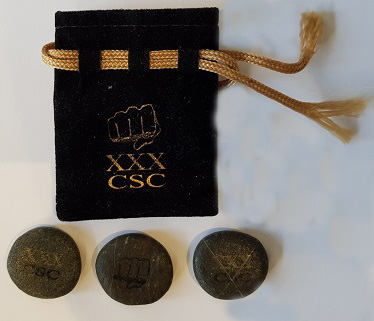Canterbury Spoofers Regular Spoof
Every Second Thursday Night at
The N04 Bar 8pm -10pm or Thereabouts
Annual Canterbury Championships
- Canterbury AGM Spoof, this is the Spoof no one wants to win
- Canterbury Champs
- Great Kiwi Beer Festival
The Great Kiwi Beer Festival Spoof
Possibly the hardest Spoof to win
World Spoofers
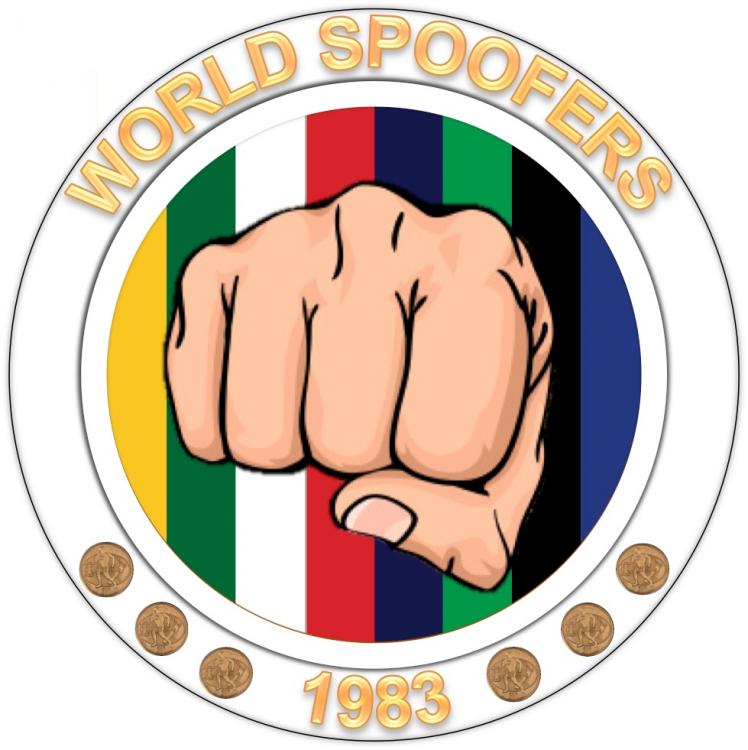
Spoofing in the News
Over the years Spoofing has been in the news numourous times.
A game coat of many colours
by Tracey Johnsotne 16th Dec 2018
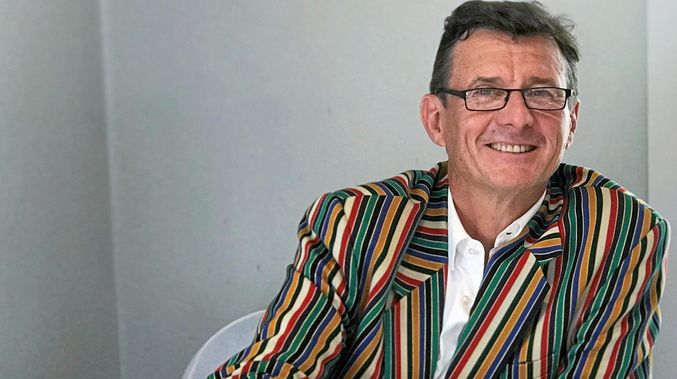 EVERY once in a while something catches your eye that just can't be ignored, and this coat of many colours made its mark on my fashion senses during this year's Melbourne Cup day.
EVERY once in a while something catches your eye that just can't be ignored, and this coat of many colours made its mark on my fashion senses during this year's Melbourne Cup day.
It's no ordinary coat. The cloth is closely guarded by British masters and meted out only to the lucky. Its origins are from the early 70s in the Fulham, England and relate to a vague gaming activity, tightly linked to rugby union, and called Spoof.
The jacket signifies membership of the spoofing community. Its colours are drawn from the major rugby playing nations. To qualify for a jacket a player needs to travel outside his home country to a World Spoofing Championship and then apply to the chaps that hold the bolt of cloth in England to have a jacket made. Once you have the jacket, you can don it any time like.
Australian Spoof master Mark Ohlsson, 61, is the next generation to take forward the almost-secret society of men behaving slightly badly at rugby union matches. He says many of the originators of spoofing are no longer around, but the game is being passed down to the next generations with old and young enjoying the camaraderie of the game.
There are gatherings of spoofers in almost all corners of the world. Mark says there is even a spoofing "school" in Bangkok due to the high number of ex-pats living there. Regional, national and world championship games are usually held around a major Rugby event such as a Bledisloe Cup. The next world championship will be in Japan during the 2019 Rugby World Cup.
But what is spoofing? It is played with three coins of equal size or denomination. There are groups, called schools, of players of two or more. The aim is to work out the total number of coins held in the players' clenched fist, and have a laugh. Each person has one guess. No duplicate guesses are allowed. Once all players have guessed, the fists are opened in order, starting with the first caller and going clockwise around the school. The total number of coins held will be added up and the person who called the correct number will be declared the winner of that round and will retire to the bar to order the drinks. The remaining school members continue until the final is contested by the last two remaining players. There are no losers in Spoo. The last man remaining gets to pay for the drinks of the other participants.
"Some of the old guys will tell you it was an ancient Mongolian game which came from the 5th century BC," Mark said. "Where it actually came from? I don't know that anyone actually knows."
What was an innocent question on the Melbourne Cup day, revealed a fascinating and colourful story.
A man of his convictions September 3, 2017
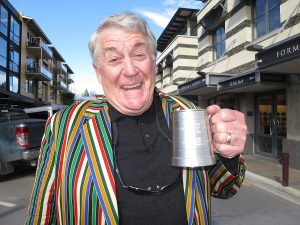
Queenstowner has trumped 86 Aussies to win the Australian spoofing championships.
Murray Cockburn, who’s played the coin game for 30 years, won the title on the eve of the first Bledisloe rugby Test in Sydney.
“They organised the Wallabies-All Blacks game the next day,” he quips.
Cockburn, 77, who’s also won the Fiji champs, says winning The Convict Colony Cup is his spoofing highlight.
He beat Kiwi Mike Banks, a double world champion, in the quarter-finals.
The current world champ, Benny Brooks, the only other New Zealander in the champs, was a beaten semi-finalist.
His seconder in the finals was Melbourne-based part-time Queens-towner Stan Gyles.
Cockburn, who’s lived on and off in Queenstown for 50 years, says there’s luck involved but also a certain amount of skill – “clearly, some people are better at it than others”.
He also organises the annual Queenstown spoofing champs, which he won two years ago.
“It took me about 10 years to win my own tournament.”
Spoofing spiffing affair
By olivia caldwell Otago Daily Times
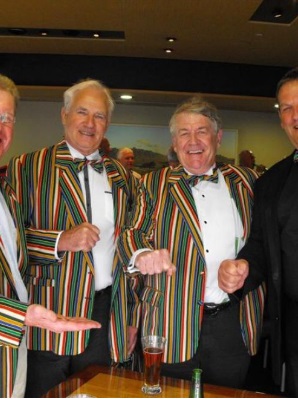
On Friday night, I was given an assignment with a twist when I attended the Queenstown Spoofing Championships.
It being Friday, I was intending on walking into Skycity Casino, getting my photograph, a general knowledge of the game and leaving pretty early on.
As it turned out, I thoroughly enjoyed my two hours of what spoofers would say was a privileged evening because the No 1 rule of spoofing is ''no women allowed''.
For those not in the know, spoofing involves groups of players around a table - each with three coins of equal size. Players must present a closed fist containing anything from nothing at all to three coins, and in each round the objective is for players to guess the aggregate number of coins being concealed. The player who guesses the correct amount moves out of the round and gains the most points.
Simple, eh?
I thought so too until I watched with bated breath how these men think long and hard before guessing, some even bluffing their way through the game to throw off opponents!
Calling involves learning another language, examples being ''Jimmy Bond'' which means seven, ''Harry Tait'' which means eight, ''baker's'' which translates as 13 and ''she was'' meaning 16 - a bit like my grandmother's housie group, really.
One of the contestants described the gathering to me as ''a gentleman's club'', but I cottoned on to this game pretty quickly and reckon the only reason women aren't invited is because we'd win more than our fair share of the games.
Current world champion Charlie Rattray, of Christchurch, told me the men's wives didn't really understand why they spent hours playing the game.
''Is there more than luck to it? I'm not sure yet. It is the sheer ridiculous, diverse and upside-down sort of sensation to it,'' Mr Rattray said.
The game involves a fair amount of drinking, and if the non-gloating rule is broken, that competitor must buy a $70-plus bottle of port for the table.
Legend has it former All Black Murray Mexted won two world cups in a row and afterwards said the only reason he triumphed was because he stayed sober. ''It's cheating, really,'' Mr Rattray said.
The game has rugby connections and world cup players gain a jacket which displays the colours of each rugby test-playing nation.
Queenstown's own Mark Dickson beat Australian Stan Gyles in the final to win Friday's championship.
Seeing as gloating isn't allowed, Mr Dickson was not approached for comment.
Traditional pre-rugby game no spoof
Jan 08 2011
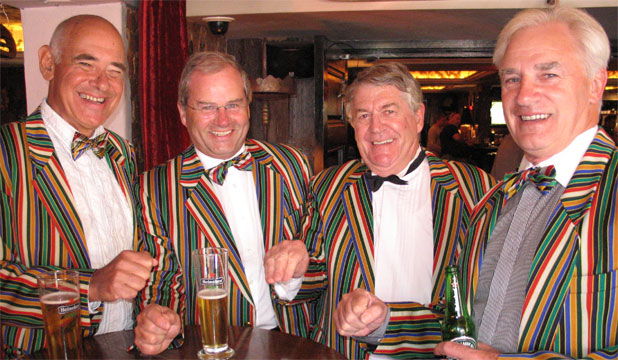 WARMING UP: Dual Aussie spoofing champion Stan Gyles, of Melbourne, Canterbury 2005 champion Hans van Schreven, Fijian 2007 champion and Queenstown organiser Murray Cockburn and former 1993 world champion Mike Banks, of Palmerston North, warm up at Ballarat Bar in Queenstown last night.
WARMING UP: Dual Aussie spoofing champion Stan Gyles, of Melbourne, Canterbury 2005 champion Hans van Schreven, Fijian 2007 champion and Queenstown organiser Murray Cockburn and former 1993 world champion Mike Banks, of Palmerston North, warm up at Ballarat Bar in Queenstown last night.
About 20 good keen spoofers turned out to take on world champion Mike Banks, of Palmerston North, for the Queenstown Spoofing Championships at The Ballarat Trading Co bar last night.
Spoofing is an age-old English tradition whereby the all-male participants dress in their black-tie best and play a 3-coin game at the pub, usually while they await the start of a rugby match.
Former All Black and rugby commentator Murray Mexted is a former double world champion.
He didn't turn up last night but lots of other champions lined up to prove their spoofing prowess. They included former Kiwi and Aussie spoofing champion John Brooks and current Aussie champion Burt Lancaster.
Mr Cockburn said spoofing had been popular in Britain for centuries.
"It's what boys do at the pub to fill in time before they go to a game of rugby."
The World Spoofing Championships would be held in New Zealand, probably Auckland, during this year's Rugby World Cup and were expected to attract 100 to 120 spoofers.
The Queenstown championships managed to keep with tradition with the annual Rugby Sevens tournament kicking off in Queenstown today.
Mr Cockburn said Queenstown's fledging club met every second Thursday at Tatler in Queenstown Mall.



